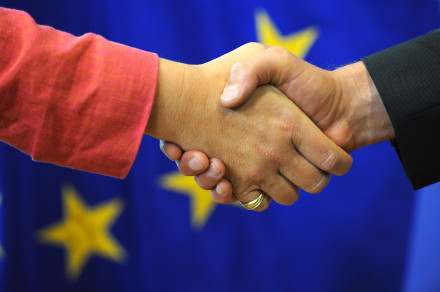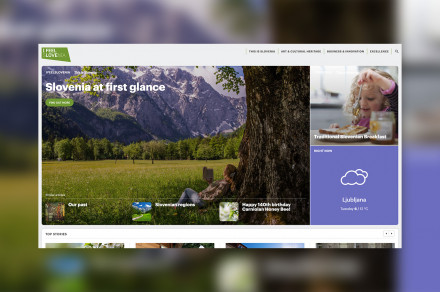Slovenian Presidency of MED9
The Presidency will focus on further enhancing the role and visibility of the MED9 in the EU and in the Mediterranean by working together on strengthening region’s resilience through better competitiveness, empowerment and capacity building, as well as close coordination on current foreign policy issues.
Slovenian MED9 Presidency Priorities
MED9 Presidency is an opportunity to emphasize the importance of the strong group of 9 EU member states and the impact they can have through a closely coordinated approach in contributing to a more resilient Mediterranean region in partnership with the Southern Neighbourhood.
Common interests of MED9 countries are closely related to the changing global environment, which calls for a more resilient and competitive EU, an EU that supports youth empowerment and capacity building and promotes intercultural dialogue for the benefit of the whole region. A Union that effectively manages the impacts of climate change, the challenges of food security, energy sustainability, migration, technological change and digitalisation. An EU that strengthens its global role through partnership with the countries of the Southern Neighbourhood, and support for the enlargement of the Western Balkan countries as part of the Mediterranean. MED9 is the driving force in regional fora such as the Union for the Mediterranean (UfM). This is why Slovenia will put special emphasis to MED9 facilitating the synergies between the EU and the UfM in the preparation of the New Pact for the Mediterranean.
1. MED9 on current regional foreign policy issues and EU enlargement
On foreign policy, the Slovenian Presidency will focus on topical issues on the agenda of the European Council and Foreign Affairs Council.
Situated at the geo-strategic crossroads of the Euro-Mediterranean area, Slovenia will continue to support the enlargement of the EU to the Western Balkans candidate states and will advocate greater engagement of these countries in the Mediterranean region. Particular attention will be devoted to the involvement of Mediterranean candidate countries: Montenegro, Albania, and Bosnia and Herzegovina in MED9 discussion.
2. MED9 on strengthening resilience, economy and competitiveness in the region
Slovenia will seek to bring together the positions of MED9 countries on key issues related to the competitiveness of the European economy and to coordinate a joint MED9 response on the financing of development-oriented measures in the future Multiannual Financial Framework and beyond.
MED9 Presidency will focus on the importance of the green transition for the competitiveness of European businesses and the strengthening of energy connectivity in the Mediterranean region. In the light of the revised Directive on the Promotion of the Use of Energy from Renewable Sources (RED), Slovenia will work to set up joint cross-border projects in this area. The MED9 and Southern Neighbourhood countries are highly vulnerable to extreme weather events, which has implications for the future of the Common Agricultural Policy. Managing the consequences of extreme weather (droughts, floods, wildfires), finding solutions through technological innovation and digitalisation and developing more resilient plant varieties are at the heart of the Slovenian Presidency's efforts.
3. MED9 for youth empowerment and capacity-building in higher education and digitalisation
Slovenia will seek to strengthen the Mediterranean Higher Education Area by establishing modalities for a scholarship mechanism for youth mobility in the Mediterranean region, while also promoting closer cooperation on artificial intelligence and other new technologies that can help address current challenges in the Mediterranean such as climate change and natural disaster response to food security, migration and cybersecurity.
Events
MED9 Meeting of the Ministers of Higher Education
Under the Slovenian MED9 Presidency, the Ministry of Higher Education, Science and Innovation will organise a Ministerial Conference: Advancing Higher Education Cooperation through the Creation of the Mediterranean Mobility Mechanism (MMM).
MED9 meeting of the Ministers of the Environment, Climate and Energy
The Ministry of the Environment, Climate and Energy will hold two back-to-back Ministerial meetings.
Energy Ministers will address the strengthening of energy connectivity in the Mediterranean, promotion of cross-border renewable energy projects and the contribution of the energy sector to a clean, fair and competitive transition.
Environment and Climate Ministers will discuss the challenges of adapting to and coping with the effects of climate change and seek common solutions to strengthen the region's resilience.
MED9 meeting of Ministers of Digitalisation
The Ministry of Digital Transformation will hold a ministerial meeting on the margins of the Telecommunications Council to discuss the use and the potential of new technologies in addressing the current challenges in the Mediterranean region while also strengthening regional cooperation in the field of digitalisation.
MED9 meeting of the Ministers of Foreign Affairs
The Ministry of Foreign and European Affairs will organise a meeting of the MED9 Foreign Ministers on the margins of the Foreign Affairs Council (FAC). A Ministerial meeting on the eve before the FAC meeting will address current regional foreign policy issues and aim to facilitate synergies between the EU and the Union for the Mediterranean in view the MED9 contribution to the preparation of the New Pact for the Mediterranean.
MED9 meeting of Ministers of Agriculture
The Ministry of Agriculture, Forestry and Food will organise a ministerial meeting dedicated to finding solutions for sustainable risk management in agriculture in the framework of the future Common Agricultural Policy.
MED9 meeting of Ministers and State Secretaries of European affairs
The Ministry of Foreign and European Affairs will organise a ministerial meeting in view of the preparation for the MED9 Leaders' Summit. The Ministers and State Secretaries for the EU Affairs will discuss the current EU issues and also address how to further strengthen support for EU enlargement to the Western Balkans and engage the Western Balkan countries more actively in the Mediterranean region.
MED9 Leaders’ Summit
At the summit ahead of the October European Council meeting, the heads of states and governments of MED9 countries will gather to discuss current EU issues and priorities for the Slovenian MED 9 Presidency.
On MED9
The MED9 Group, comprising Cyprus, France, Greece, Croatia, Italy, Malta, Portugal, Spain and Slovenia, was established in 2013 on the initiative of the Foreign Ministers of Cyprus and Spain, with the aim of cooperation between EU Member States on general issues related to the Mediterranean.
Slovenia and Croatia joined the group at the 9th summit of the then MED7 in 2021 in Athens, which led to the group being renamed MED9. The countries in this group represent a third of the EU’s Member States and up to 45% of the EU’s population, ensuring them considerable leverage in the EU when more closely aligning their common interests and positions. Closer cooperation within the group also helps to keep the Mediterranean issues high on the EU agenda.
The MED9 group is committed to strengthening the cooperation of the Mediterranean EU Member States on important EU issues and serves to coordinate their positions more closely within the EU in areas of shared interest. On the other hand, MED9 seeks to raise visibility and stimulate debate on the Mediterranean priorities within the EU and strengthen cooperation with the Southern Neighbourhood partnership. These priorities include not only political dialogue and cooperation, security and stability in the region, but also other common challenges and opportunities that connect all shores of the Mediterranean, such as coping with the adverse effects of climate change, energy and food security, migration, water, youth, the green transition, blue economy and economic development.
Cooperation between the MED9 countries takes the form of regular informal Ministerial coordination meetings held prior to various EU Council formations and the European Council. Thematic Ministerial meetings are organized to review the implementation of shared commitments and closely coordinate positions on topical issues in specific areas. To this end, MED9 coordination meetings between also take place in multilateral organisations and in other EU capitals. Regular meetings of Ministers or State Secretaries for EU affairs are held to prepare for the MED9 Summit as the last and most important event of each Presidency.







